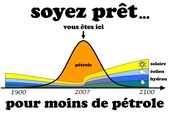While the World Climate Conference is taking place in Geneva until September 4, the WWF published a study on Wednesday, September 2, on the consequences of Arctic warming.
The Secretary General of the United Nations, Ban Ki-moon, expressed his alarm on Thursday (September 3) in Geneva about the acceleration of global warming. "We have our foot stuck on the accelerator and we are heading towards the abyss," said Mr. Ban before the 3rd UN Climate Conference, meeting in Geneva since the beginning of the week. The United Nations secretary-general, returning from the Arctic where he saw the ravages of climate change, warned that "what is happening now" must happen much later, according to scientists' predictions. "Scientists have been accused for years of being alarmists. But the real alarmists are those who say that climate action cannot be taken because it would slow economic growth," he said. declared.
The WWF study looked at the role of the Arctic in climate change. How is the Arctic critical to the climate?
The Arctic is warming twice as fast as the rest of the Earth. This is something that is observed today and about which we do not necessarily have all the elements of explanation. However, we know that due to the tilt of the Earth, it is an area particularly exposed to the Sun, especially during the summer period. It heats up faster because, until now, the ice has served as a mirror and reflected the sun's rays. But now that the ice is shrinking like sorrow for the benefit of the Arctic Ocean, the latter, by its darker color, no longer has this role of reflection of the sun's rays. In addition, the scarcity of ice, permafrost and underwater ice causes an accelerated release of methane and the carbon dioxide they contain. It also acts as an accelerator of climate change.
Finally, the Arctic Ocean also has a role of climate regulator, which is called into question when the melting ice changes its salinization, because it contains more and more fresh water. This completely disrupts the functioning of ecosystems and major ocean currents, such as the Gulf Stream, which notably makes it possible to soften the climate in Europe. If the Gulf Stream slows down by 25 to 30%, as it is looming, the winters could become much colder in Europe.
The scientific data that WWF has collected indicates that an ocean rise of more than a meter is to be feared. What would be the consequences ?
Under an assumption of four degrees higher temperatures by the end of the century, the oceans could rise by more than a meter and threaten up to a quarter of the world's population. A temperature rise of four degrees is the worst scenario envisaged by the Intergovernmental Panel on Climate (IPCC) in 2007. Everything shows that this scenario is looming if nothing is done. The rise in sea level will not be the same everywhere on the surface of the globe but will vary from one continent to another, from one coastal city to another. The populations of large megalopolises in coastal areas, on the Indian subcontinent - Bangladesh being the best known example -, in South-East Asia, China, Indonesia, but also in Latin America, will be particularly threatened. a large part of the population lives on the coasts, in Central America. However, these large megalopolises are not necessarily prepared as in Europe, where, for example in the Netherlands, we have the means and the technology necessary to build dykes in order to protect the population. In addition, in large megalopolises in poor countries, many people live in slums. These populations will be the most vulnerable to flooding.
Another phenomenon to take into account is that there is land that tends to sink, which increases the risk of flooding in coastal areas. This is particularly the case in the Pacific islands such as Tuvalu or Vanuatu, where local populations will have to leave their country of origin to settle elsewhere. Salt water is already starting to infiltrate inland, making it increasingly difficult
to cultivate.
How to prevent this "warming spiral"?
WWF has revised its greenhouse gas reduction targets. We are now asking for much more ambitious targets for the Copenhagen summit [which, in December, must reach agreement on the follow-up to be given to the Kyoto protocol, which ends in 2012], namely a reduction of 80% emissions by 2050, globally, for all countries. Industrialized countries having a historic responsibility, they must reduce their greenhouse gas emissions by 40% by 2020 and they must stop the growth of these emissions from 2015. In any case, global warming is already taking place. There is a high concentration of greenhouse gases in the atmosphere, and the CO2 stored there will stay there for several years. The objective now is to limit the extent of global warming to two degrees over the entire century. Because beyond that, there is a risk of irreversible impacts.
France is committed to reducing its emissions by at least 30% by 2020. We therefore believe that this is not enough. Especially since this objective, like that which the European Union has set for itself, is conditional: it is linked to obtaining an agreement deemed satisfactory at the next summit in Copenhagen. One of the criteria being that China also undertakes to reduce its quantified and ambitious emissions. Otherwise, the objective of reducing greenhouse gases by 2020 will only be 20%.
Interview by Hugo Lattard
the world news source


